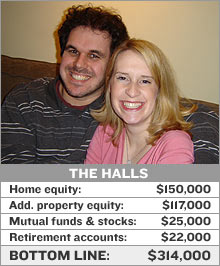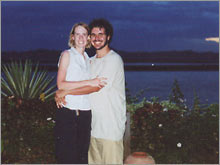 |
 |
| The Halls in Myanmar |
|
|
|
|
|
NEW YORK (CNN/Money) -
Dave and Annie Hall have priorities: They want to build up their retirement accounts and other investments, live comfortably, and become millionaires over the next 15 years.
To accomplish these goals, budgeting is key. Dedicating dollars toward specific purposes helps keep the couple on a tight track.
"Building wealth," Dave says, "is not a matter of how much you make as how much you spend."
The 31-year-old social studies teacher and wife Annie, 27, a social worker, earn about $120,000 a year including an extra $40,000 Dave makes as an adjunct professor and teacher trainer.
They budget $300 a month for the supermarket. That includes groceries, paper products and cleaners, just about all their household goods. They also put in $60 a week each for what they loosely called "entertainment," which includes everything from dinners out to movies to lunch to haircuts.
They put more than $600 a month into retirement accounts, which Dave plans to bump that to $900 a month starting in April.
"We're quite careful about budgeting," he says. "I don't feel I'm living a millionaire's life, but I expect to be one in 12 or 14 years."
This April, a new little budget item will be making her debut � Annie will give birth to a baby girl.
"We'll raise our supermarket budget to $500 a month, and an extra $15 a week for baby goods," says Dave. It means less coming in, with Annie staying home, at least temporarily.
That home is a nice three bedroom, two-and-a-half bath they bought for $155,000 in Warrington, Pennsylvania, four years ago. (It's now worth about $290,000.) They don't obsess about cars, owning a five-year-old Saturn and a 10-year-old Altima.
Globetrotting
By avoiding most luxuries, Hall figures the couple can spend discretionary funds on things they truly love. Like travel.
Dave started going places while in college. He took a "semester at sea," sailing around the world with stops in South America, Africa, and Asia. He was able to see some of those countries beyond the ports of call, always on the cheap.
"The least I ever spent for a hotel room was 20 or 30 cents in India," says Dave.
The trip implanted a wanderlust that Dave's never shaken. While completing his undergraduate work at Hampshire College, he visited Africa twice more and Asia once. Zimbabwe, Mozambique, Senegal, India, and Vietnam are just some of the countries he has seen.
How does Annie find the traveling conditions in Africa?
"In Mozambique, we had to go to a hotel, and she asked for a bucket of water to bathe," Dave remembers. "When the water went down the drain, several cockroaches came out of it. Now, we've bumped up what we spend on accommodations."
Still, "There's something valuable about learning that you can get by with less," says Dave.
That lesson crystalized in Malawi, where Dave met a young, very poor, African man and his mother. "I gave him a pair of broken sandals I had. These sandals were trash to me but they were the greatest footwear he ever had. His mother thanked me with tears in her eyes."
Dave doesn't mind splurging on things he considers worthwhile. A few years ago he ran a losing race for the Pennsylvania State House of Representatives, on a platform of HMO reform, school improvement, and protecting open space.
Satisfying though the exercise was, it did mean taking a financial hit in lost work time and expenses (about $10,000) to do it.
Roots
Temperamentally, Dave has always been frugal, but what really got him thinking about finances was reading "The MIllionaire Next Door," which describes the habits of some Americans who built wealth on limited income.
(For more about the surprisingly rich, click here.)
Shortly afterward, a colleague instructed him on some of the benefits of real estate investing. He shifted gears out of equities to properties.
A year ago, the Halls went in with Annie's parents on a beach-front condo in Ocean City, Maryland, they bought for $400,000. Similar ones now sell for $550,000 to $580,000. In February, they bought a rowhouse in nearby Norristown for $58,000.
They rent out the beach condo for the summer months and spend some weekends there. Rents from the rowhouse net them about $250 a month in cash flow.
All told, Dave figures the couple has about $260,000 in equity in their three places. He'd like to buy an additional income property each year.
They also own mutual funds worth about $12,000 and stocks worth about $13,000. Their retirement accounts combine for another $22,000. Other than loans on the properties, they carry no debt.
All told, they have more than $300,000 new worth, a good start toward their million-dollar goal.
They may make it on their timetable, but they don't figure to sacrifice their passions to achieve it.
"I want my daughter to see the world by the time she's 10," says Dave.
--------------------------------------
Click here to read about Millionaires in the making Ryan and Danielle Quilling.
Click here to read about Millionaires in the making Jeff and Anna Briere.
Click here to read about Millionaire in the making Megan Murray.
Think you're a millionaire in the making and would like to be featured, click here.

|